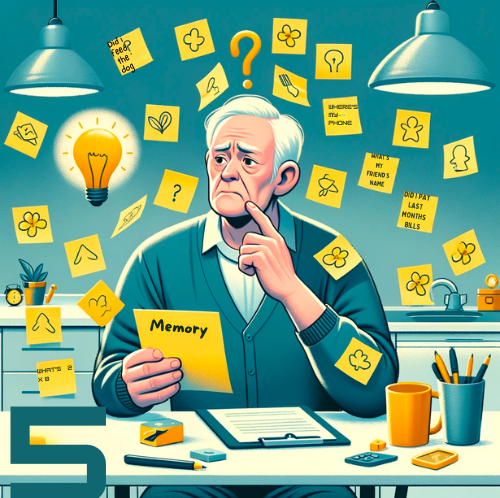Alzheimer’s disease, a condition that notably impacts memory, cognition, and behavior, presents symptoms that can widely vary among individuals. One of the earliest signs of Alzheimer’s often involves memory challenges, but it also includes difficulties in non-memory cognitive aspects like language usage, understanding visual images and spatial relationships, and impaired reasoning or judgment. As the disease advances, symptoms intensify, leading to increased confusion and behavioral changes, marking the progression from mild stages, recognizable by disrupted daily life due to memory loss and poor judgment, to severe stages, where individuals become entirely dependent on others for care, losing the ability to communicate and engage with their surroundings.

The onset of Alzheimer’s typically occurs in individuals’ mid-60s, identified as late-onset Alzheimer’s, while early-onset Alzheimer’s can appear as early as the 30s, though less commonly. The disease progresses through several clinical stages: preclinical, mild (early-stage), moderate, and severe (late-stage), with the preclinical phase characterized by brain changes, like amyloid plaque formation or tau tangles, that precede memory and thinking issues by a decade or more. Not everyone with such brain changes progresses to dementia, making early detection and intervention crucial.

During the mild stage, individuals might appear healthy but struggle increasingly with making sense of the world around them. Symptoms may include significant memory loss affecting daily activities, challenges in planning or problem-solving, mood and personality changes, and increased anxiety or aggression. The moderate stage necessitates more intensive supervision due to symptoms like increased confusion, memory loss, withdrawal from social activities, and difficulty with language and logical thinking, alongside sleep pattern changes and occasionally failing to recognize close family and friends.

In severe Alzheimer’s, the person becomes unable to communicate, losing awareness of their experiences and surroundings, often leading to bed confinement as their physical condition declines. A common cause of death in Alzheimer’s patients is aspiration pneumonia, which occurs when the individual can’t swallow properly, leading to the inhalation of food or liquids into the lungs.
While no cure exists for Alzheimer’s, certain U.S. Food and Drug Administration-approved medications may alleviate symptoms. Modifications to the home environment and daily routines can also help manage cognitive changes. Additionally, mild cognitive impairment (MCI) could be an early sign of Alzheimer’s, though not everyone with MCI develops the disease. Symptoms of MCI include frequently losing items, forgetting appointments, and difficulty finding words.
It’s crucial to consult a doctor if memory loss or cognitive issues arise, as early diagnosis and intervention can significantly impact the management of Alzheimer’s. The article underscores the importance of understanding Alzheimer’s symptoms, stages, and the significance of seeking medical advice for memory concerns, offering insights into navigating this challenging condition.
Resource credit: National Institute of Aging
Please consult your doctor prior to adding any supplements to your diet and/or health.
Here’s a little transparency: Our website contains affiliate links. This means if you click and make a purchase, we may receive a small commission. Don’t worry, there’s no extra cost to you. It’s a simple way you can support our mission to bring you quality content.

Hi Gary,
Thank you for this article; I found it very insightful as I find myself navigating a loved one’s Alzheimer’s diagnosis. My mother has been showing symptoms over the past few years, and as you’ve described, they’ve been intensifying. It’s been a journey working with her specialists to enhance her quality of life. I’m grateful we’ve seen some positive developments, particularly when maintaining her social engagement.
The medications have been somewhat helpful, and it’s encouraging to witness her moments of clarity and engagement. Your article’s discussion of the importance of early detection and intervention has reaffirmed our approach to my mother’s care. We’re also acutely aware of the challenges ahead as you described the progression from mild to severe stages of the disease.
I’m particularly interested in the research aspect of Alzheimer’s and the potential for patient involvement. The advancements in understanding the preclinical brain changes and the value of early diagnosis are areas I’m keen on following. Are you familiar with any ongoing research studies or opportunities for Alzheimer’s patients to participate in that could contribute to this growing body of knowledge and potentially offer hope for families like mine?
Thank you for your insights—they are more helpful than you might realize.
Deepest gratitude,
Kyle
Dear Kyle,
Thank you so much for sharing your story and the experiences you’re navigating with your mother’s Alzheimer’s diagnosis. It’s heartening to hear that you found the article insightful and that it has, in some way, supported you through this challenging journey. The strength and dedication you’re showing in caring for your mother are truly admirable. It’s encouraging to hear about the positive developments, especially regarding her social engagement, as maintaining connections can be incredibly beneficial for individuals with Alzheimer’s.
Your interest in the research aspect of Alzheimer’s and the potential for patient involvement is commendable. There is indeed ongoing research aimed at understanding Alzheimer’s more deeply, particularly in the realms of early detection, intervention, and even prevention. One notable study is the Alzheimer’s Disease Neuroimaging Initiative (ADNI), which is ongoing and seeks to understand the progression of Alzheimer’s through neuroimaging and biomarkers. The ADNI study has contributed significantly to the understanding of preclinical brain changes associated with Alzheimer’s.
Another promising area of research is the A4 Study (Anti-Amyloid Treatment in Asymptomatic Alzheimer’s study), which focuses on individuals who are at risk of developing Alzheimer’s but have not yet shown symptoms. This study aims to test whether a new investigational treatment can slow the memory loss caused by Alzheimer’s.
Participation in such studies not only contributes to the growing body of knowledge on Alzheimer’s but also offers hope and potential pathways to new treatments. I would recommend discussing these opportunities with your mother’s healthcare team, as they can provide guidance on eligibility and the potential benefits and risks of participation.
For more information and to explore participation opportunities, the Alzheimer’s Association website is a valuable resource. They offer a tool called TrialMatch, which helps connect patients and caregivers with ongoing Alzheimer’s research studies based on personal criteria and preferences.
Your pursuit of knowledge and proactive approach to your mother’s care is inspiring. While the road ahead may present its challenges, it’s clear that your mother is surrounded by love and unwavering support. Please know that your efforts make a significant difference in her life and well-being.
Thank you again for your kind words about the article and for opening up about your personal journey. My thoughts are with you and your family during this time, and I wish you continued strength and moments of joy with your mother.
On a side note, I see from you profile picture you are a motorcyclist. I am as well, however I’m a HD man but truly understand the thrill of a sport bike. Be safe and keep the rubber down and shiny side up, my biker brother.
With deepest gratitude and respect,
Gary
Hi Kyle, I just wanted to let you know that I’ll be coming out with a post later today that I think you will find interesting with regards to your mother, at least I hope and pray that it is. God Bless you and your family… Gary
I have been lucky to have all of my grandparents retain a keen mind all the way until the end of their lives. Many experience that devastating loss of function and memory due to Alzheimer’s. It is sad that so many people have to suffer with the affects of this disease.
I have been using a brain training app with activities that can aid in the prevention of Alzheimer’s. I would hope that with prevention and/or early intervention, more people could avoid the severest version of the disease.. Posts like these that detail the warning signs are important; hopefully your article can reach people exactly when they need to see it, and it will encourage them to get the care they need in order to maintain the best quality of life possible!
Hi Jessica,
Thank you so much for sharing your thoughts and personal experiences regarding the impact of Alzheimer’s disease. It’s heartwarming to hear about your grandparents’ ability to maintain a sharp mind throughout their lives. Indeed, Alzheimer’s disease brings a profound sense of loss, not only to the individuals directly affected but also to their families and loved ones. It’s a condition that challenges our understanding of health and wellness in profound ways.
Your use of a brain training app is a fantastic example of proactive measures that can be taken to support cognitive health. While the science is still evolving, there is growing evidence to suggest that engaging in activities that challenge the brain can be beneficial. These activities, which range from puzzles and memory games to learning new skills, can potentially help build cognitive reserve and delay the onset of symptoms for those at risk of Alzheimer’s.
Prevention and early intervention are indeed critical in managing the impact of Alzheimer’s disease. By fostering awareness and understanding of the early warning signs, we can empower individuals to seek medical advice and intervention sooner rather than later. Early diagnosis can open the door to treatment options that may help manage symptoms and improve quality of life, even though a cure remains elusive.
I’m deeply touched by your hope that articles like mine can reach people when they most need it. Raising awareness about the warning signs of Alzheimer’s is crucial for early intervention, and I share your hope that it will inspire individuals to take action towards maintaining their cognitive health. Your comment underscores the importance of education and advocacy in combating the challenges posed by Alzheimer’s disease.
Thank you again for your insightful comment, Jessica. Your optimism and proactive approach to brain health are inspiring. Together, through education and community support, we can make a difference in the lives of those affected by Alzheimer’s and their families, striving for the best quality of life possible for everyone involved.
Best wishes,
Gary